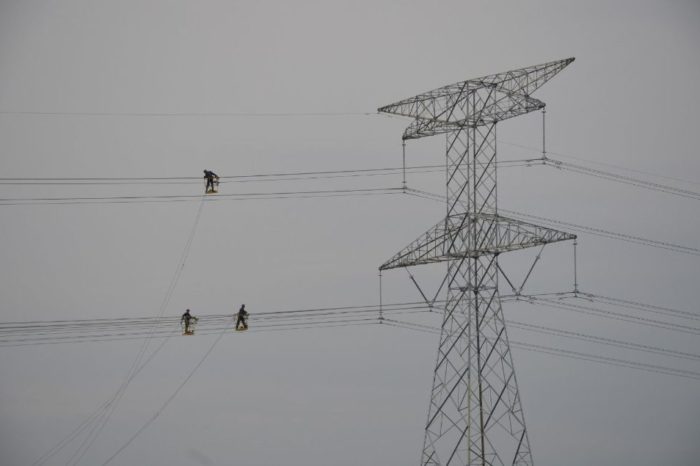Cosmin Ghita, CEO Nuclearelectrica: “The digital era has all the ingredients to put leadership on the highest level ever: in a world of technology, the way you lead people makes all the difference”

“Leadership is an essential function of coordinating any business, any domain and in addition to the inherent results, it is a strong converter and integrator of any organizational culture. If the leadership promotes within the organization a strong, constructive organizational culture, things are 50% solved,” Cosmin Ghita, CEO Nuclearelectrica said in an interview for The Diplomat-Bucharest.
“We should be more prepared, both in terms of businesses and society, to support people. With quite a few fields facing serious financial challenges, the first to suffer are employees. And when I say more prepared I mean more resilient. During a crisis, when an industry or field has been hit, solutions are scarce and the first measure is to cut costs drastically. This has a snowball effect in economy, society. That’s why I truly believe that lessons learnt during this crisis should become basis for recovery and resilience and this should be the current motivator.”
What leadership skills do you find most useful in the current changing work environment?
Leadership is an essential function of coordinating any business, any domain and in addition to the inherent results, it is a strong converter and integrator of any organizational culture. If the leadership promotes within the organization a strong, constructive organizational culture, things are 50% solved.
Most of the times we strongly emphasize leadership in crisis situations, either financial, or non-financial, as it is the case these days. Leadership is not crisis associated, is normal times associated. What one builds during normal times, benefits from in crisis situation. Even though there are predictive signs of a crisis, is not often that in real situations the impact is both unknown and significant causing major disruptions for business, society, education.
In such situations there are certain businesses that are compelled to withstand any conditions because their output is a strategic component of ensuring continuity for others. The energy industry is such a strategic domain. As everyone else, we have felt the full impact of the pandemic.
The window of opportunity to make decisions and act upon them is extremely small. Hence, the vital importance of prior leadership as the organization has an already build in readiness in accepting and implementing different measures.
Going back to the set of leadership skills, there are three major areas of concern: first and foremost, concern for people, especially during a pandemic, concern for activities and results as energy is a vital resource during such a crisis and direct involvement, participation of leaders, as, ultimately, this is our job. People, from all walks of life, value and respond to real relationships, appreciate fairness and openness, thrive whenever the working environment is built on solid communications, respect, involvement, capitalization of their strengths and capabilities. As for the activities and results, regardless of the measures, you need to roll up your sleeves and do what you preach. You need to get down to the shop floor and walk the talk. Apart from taking responsibility, you need to find the perfect balance between decision-making and individual autonomy, facilitate work, make people feel that in everything they do, decide, strive for there is a strong sense of worth, build a trusting environment and empower people with everything it takes to firstly keep them safe and secondly, allow them to do their job properly. And I can guarantee you that organizations will 100% benefit from this nourished working climate.
Think of the fact that Covid 19 came with a lot of changes, implemented in a very short time, with hundreds of our operating personnel isolated in order to continue operation and production, with sudden restrictive measures for everyone. This is a major disruption of working life, personnel life enhanced by the concern for health. Still, because people join in and they build alongside management, we have managed to carry on as usual. Acute crisis are rapid, accurate, informed decision-making and even faster implementing. Leadership is what you have priorly done to get people on board. Think of leadership as breaking down barriers and strengthening organizational culture. We have also found that in times of crisis, what mattered most were the soft skills, the emotional intelligence, the empathy and capability of leaders to relate to employees concerns and problems and to address quickly those problems with concrete actions and measures, so that the organization feels and acts as a unified system, no one is left on the outside and engagement is raised to meet the new challenges.
Which are the empowering mindsets and building the sense of meaning & purpose, both for employers and employees, to keep each other engaged in reaching the business objectives in 2020 and in the next year?
Apart from the role of leadership, which we have already discussed, there are two other important coordinates: one is long-term resilience, the other one is short-term resilience. Resilience is top trending when it comes to full functionality of organizations: for businesses and mainly their continuity, employees, employers, leadership. We all should be pretty familiar with resilience and its related measures as we have seen crisis before. Now, it has become critical. To have business resilience is to have the capacity to withstand a knock, adapt fast and work for recovery. Resilience has a simple learning curve, it is a learning process. Business should have learnt from prior disruptions and therefore be a little more prepared for the current situation. It’s all the more important, since Covid 19 is an atypical crisis to what we are familiar with, so building in short-term business resilience may equate survival. We’ve all been there: reviewing plans, strategies, assessing new scenarios, mitigating human and financial impact. However, long-term resilience is in fact holistic system approach. And this type of resilience covers the big sustainability picture of every business: operations, production, human resources, supply chain, networking, international cooperation, diversification, complex risk management, investments.
This is how very strong organizations manage to withstand huge impacts whenever they occur. They already have strong build in capabilities. It is essential to enter a crisis having some business and financial flexibility.
The human factor is the base of every business. We should be more prepared, both in terms of businesses and society, to support people. With quite a few fields facing serious financial challenges, the first to suffer are employees. And when I say more prepared I mean more resilient. During a crisis, when an industry or field has been hit, solutions are scarce and the first measure is to cut costs drastically. This has a snowball effect in economy, society.
That’s why I truly believe that lessons learnt during this crisis should become basis for recovery and resilience and this should be the current motivator.
On the other hand, we should fully exploit the benefits of digitalization and significantly reduce bureaucracy. Most businesses were actually forced by the pandemic to employ digitalization. If used earlier this would have been today a form of resilience. It helps both employers and employees, it provides continuity, and it can bring more creative approaches to push up your business.
The World Economic Forum’s report on the future of jobs concludes that, by 2022, no less than 54% of all employees will require significant re- and upskilling. Of these, about 35% are expected to require additional training of up to six months, while 9% will require reskilling lasting 6-12 months and 10% will require additional skills training of more than a year.
In the digital era the difference between success and failure could be determined by the speed you take action with. Agility is the essential attribute and the digital leadership requires foremost adaptability to work under pressure in a very dynamic environment.
Therefore, leadership is once again about building strong participation, understanding and accountability. Leaders must firstly understand very well the digital era, its dynamic courses of action and be able to provide direction and aim.
This new approach will most likely develop much more the horizontal leadership as opposed to hierarchical leadership. Hence why participation and accountability are the pillars of the digital era leadership. People need empowerment, bridges need to be build and support entire organizational structures.
Empowerment comes from re- and upskilling, no time for inertia and regrets as the organizational structures, work processes, people skills and approaches will become quite different quite fast from what we know today.
And last but not least, we all need to adopt a mindset of awareness, develop our peripheral view and start think more about long term purposes and scopes of the business world instead of short term objectives. By 2050, the cost of climate change could reach up to 1% of world GDP per annum for example. Global problems require global solutions.
What should be a CEO’s and leader’s power message on business resilience conveyed to peers, partners and employees for 2021, in order to enhance the trust and engagement?
In line to our discussion, I would say work on Build Back Better resilience principle, facilitate investment at governmental and local levels, provide incentives, assess and where the case be eliminate regulatory and legal overlapping that impede investments, use capital markets to your advantage, upgrade business infrastructure, use the holistic approach, one at the time does no longer cut it, keep your experts and invest in attracting new comers, communicate needs for resilience to stakeholders and public, invest in education, capitalize on technology. I would also tie the concept of resilience to that of sustainability, because in these critical times we tend to lose focus of long term perspective and take decisions which might effect our chances in the long term. Profitability and sustainability do not exclude themselves, in fact, we need to build business models capable of delivering both.
You don’t put effort into business resilience and sustainability, you definitely cannot enhance people’s trust. These two are interdependent.
The digital era has all the ingredients to put leadership on the highest level ever: in a world of technology, the way you lead people makes all the difference!
How can a CEO and leader of an organization capitalize on the current challenges to enhance and promote the company’s competition advantages currently?
During a crisis, some business are prone to higher revenues by the very nature of their activity, however a crisis is a crisis. It impacts every single aspect and domain of a state. The only way, that I see, to capitalize on the current challenges is to protect your business and your employees. And I’ve explained earlier how I think this could be done. The idea that every crisis has opportunities associated with it, it’s more motivational in nature than solid reality. It is true that it provides faster adaptation to change, but other than that it comes with a lot of challenges. I also think that challenges like Covid 19 give us a chance to rethink our competitive advantages, as the world moves towards cooperation and interrelations than towards traditional rivalry between businesses. We have seen companies move into totally different businesses and companies which refuse to acknowledge the changes around them. Disruption is no longer a threat for the future, but our new daily reality and the way we position our company to deal with it resides in our ability to disrupt ourselves first, to ask ourselves what value are we bringing to the world and to our employees and build our competitive advantages around real value creation.
Which are the current concerns of a CEO / leader in 2020? Which are the hopes for 2021?
Ensuring continuity, cutting unnecessary costs and increasing strategic investment costs, motivating people. During a crisis situation, as a manager, you strive harder for growth. If the company already has resilience than this process is natural and rewarding. If, on the contrary, the company has little to no business resilience, you will see a lot of cost cutting in the full detriment of the business because this is the only measure left to apply. This is a not a healthy, withstanding business environment.
I also expect to see a lot of stability from the state in terms of regulations, energy market regulations especially, so that we allow the market to deliver fair competition and prices.
At SNN, we are fully adapted to the new working and networking environment, therefore we do business as usual. Of course, we pay a lot of attention to strategies, plans, investment projects. I hope that 2021 will bring us close to the life we used to know, however life we used to know will include from now on digitalization, thus faster decision-making, agility, time and money efficiency. I also expect the role of R&D and new technologies (also in the nuclear field) to increase as businesses and Governments are looking for economic relaunch opportunities from a more sustainable and resilient perspective.
What kind of innovative measures and inclusive leadership initiatives have been applied within your organization this year, to better cope with the current context and bring the business forward in 2021?
In terms of leadership, we acted as a team in a perfect synchrony. As I have said, roll-up your sleeves and do what you have to do. I had two main priorities: the health of my colleagues and the continuity of operation and production. We cover 18% of Romania’s consumption needs. Disruptions are not an option.
On the other hand, we worked hard on digitalization. When Covid 19 emerged, we were already in full process to develop digitalization. Nonetheless, we strived to better integrate the business component with automation, monitorization, communication and control functions. We are not talking operation of the power plant, as this has always been in line with the international standards of automation and digitalization, but modernization of the hardware and software for all business processes. So, what we have addressed were: technological modernization of the IT process systems, investments in new automation and optimization solutions, innovation and education through the center of digital excellence for the improvement of the cyber security of the operational area, cyber security in itself in both IT and operational areas, a better integrated and coordinated IT-OP area, intensive communication and sharing of information so that everyone is update and protected.
This is one example of business resilience at SNN. Both my colleagues and business are just fine.














